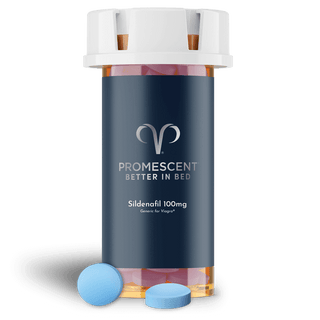One cause of erectile dysfunction that can sometimes be overlooked is medication. Find out the top 10 drugs that can cause erectile dysfunction.

20 reviews


2,896 reviews

Erectile dysfunction (ED) is a common yet complex issue. It's important to understand all its potential causes and implications.
One cause that can sometimes be overlooked is medication-induced ED. There are a variety of drugs that can potentially make it more difficult to get an erection.
Different drugs that can cause erectile dysfunction include SSRIs, beta blockers, and diuretics.
Talk to your doctor if you suspect your medication may be causing ED. They may adjust the dosage or suggest an alternative.
Lifestyle factors that can cause ED include having a poor diet and living a sedentary lifestyle.
We’ll go over some of the most common ones that can affect sexual function. We’ll also discuss other causes of ED that need to be kept in mind.
Erectile dysfunction is a medical condition that affects millions of men worldwide. It is characterized by the inability to get or keep an erection sufficient for satisfactory sexual performance.
Factors influencing this condition can range from physiological to psychological and, as we will discuss further, certain medications.
A vast array of prescription drugs are known to have side effects, and unfortunately, some of these side effects may include ED. It's estimated that approximately 25% of all ED cases are actually a result of medication.
There are several types of medications that could potentially cause ED. Here is a list of some of the most common ones:
These medications, like fluoxetine (Prozac) and sertraline (Zoloft), used to treat depression and anxiety disorders, can sometimes lead to sexual side effects including ED. They may impact the neurotransmitters in the brain involved in sexual arousal and erections.
Similar to SSRIs, SNRIs such as venlafaxine (Effexor) and duloxetine (Cymbalta) can also cause sexual side effects by altering neurotransmitter levels in the brain.
Drugs like amitriptyline (Elavil) and nortriptyline (Pamelor) can cause ED because they interfere with the action of chemicals in the brain that transmit nerve signals for sexual arousal.
Beta blockers, including propranolol (Inderal) and atenolol (Tenormin), are commonly used for hypertension and heart conditions.
They can cause ED by reducing nerve signals necessary for an erection and decreasing heart rate, which can limit blood flow to the penis.
Diuretics, also known as "water pills" and often used to control high blood pressure, drugs like hydrochlorothiazide (Microzide) can lead to ED by decreasing blood flow to the penis and decreasing the force of blood flow necessary to achieve and maintain an erection.
Pro Tip: VitaFLUX Nitric Oxide Booster helps to relax blood vessels and allow more blood flow through increased nitric oxide production.
Medications like ranitidine (Zantac) and cimetidine (Tagamet), used for peptic ulcer disease and gastric reflux, can cause ED by inhibiting the action of testosterone, a hormone essential for sexual desire and erections.
These medications, such as finasteride (Proscar) and dutasteride (Avodart), used for benign prostatic hyperplasia and hair loss, can lead to ED by decreasing the levels of dihydrotestosterone, a hormone crucial for male sexual function.
Antipsychotic drugs like risperidone (Risperdal) and olanzapine (Zyprexa), used for treating conditions like schizophrenia and bipolar disorder, can cause ED by blocking dopamine, a neurotransmitter involved in sexual desire.
Medications such as diazepam (Valium) and alprazolam (Xanax), used for anxiety disorders and insomnia, can lead to ED by suppressing the central nervous system, which can affect nerve signals needed for sexual arousal and erections.
Long-term use of painkillers like morphine and oxycodone can lead to hormonal changes, such as decreased testosterone levels, which can cause ED.
If you suspect your medication is causing ED, it's crucial to discuss this with your healthcare provider. Do not discontinue or change your medication without professional advice.
Recognizing medication-induced ED can be challenging, as ED can occur due to various other reasons. However, if ED symptoms appear soon after starting a new medication, it could indicate a potential link.
Management strategies can range from dose adjustment to switching to a different drug. In some cases, your healthcare provider might suggest lifestyle changes or recommend treatments specifically for ED.
While medications may be a significant contributor to ED, it's essential not to overlook the role of lifestyle factors. Certain habits can increase the risk of ED or worsen the condition.
Conversely, healthy changes can alleviate ED symptoms and improve sexual health. Here are a few lifestyle factors to consider as possible causes of ED:
The silver lining is that making positive changes to your lifestyle can help manage ED effectively.
Incorporating a diet rich in fruits, vegetables, whole grains, and lean proteins can improve cardiovascular health, thus aiding in better erectile function.
Regular physical activity promotes healthy blood circulation, vital for good erectile health.
Cutting down on alcohol consumption and quitting smoking can significantly reduce the risk of ED.
Erectile Dysfunction can be a challenging condition to deal with. But knowing what’s causing it will help with determining a proper treatment plan.
Medications that are helping you with one condition can sometimes cause erectile dysfunction. Consider whether the condition starts occurring before or after the medication was started.
It’s important to remember that not everyone taking the medications listed will experience ED. Be sure not to adjust or discontinue your dosage using them without discussing with a healthcare professional.
Adjusting your medication along with adopting healthy lifestyle choices will give you a good chance of treating ED.
فريقنا لديه بأكثر من عشر سنوات من الخبرة في مجال الصحة الجنسية وهم خبراء في الاضطرابات الجنسية، مثل سرعة القذف. نحن نساعد الأزواج والأفراد على فهم أفضل لخيارات العلاج المتاحة لأنواع مختلفة من الاحتياجات الجنسية وتثقيف الجمهور بشأن كل الأشياء المتعلقة بالعلاقة الحميمة. نراجع كل المحتوى المكتوب لدينا طبيًّا للتأكد من دقته وموثوقيته.
Absorption Pharmaceuticals LLC (Promescent) has strict informational citing guidelines and relies on peer-reviewed studies, academic or research institutions, medical associations, and medical experts. We attempt to use primary sources and refrain from using tertiary references and only citing trustworthy sources. Each article is reviewed, written, and updated by Medical Professionals or authoritative Experts in a specific, related field of practice. You can find out more about how we ensure our content is accurate and current by reading our editorial policy.
Jing E, Straw-Wilson K. Sexual dysfunction in selective serotonin reuptake inhibitors (SSRIs) and potential solutions: A narrative literature review. Ment Health Clin. 2016 Jun 29;6(4):191-196. doi: 10.9740/mhc.2016.07.191. PMID: 29955469; PMCID: PMC6007725. Accessed on May, 30, 2023.
Chen LW, Chen MY, Lian ZP, Lin HS, Chien CC, Yin HL, Chu YH, Chen KY. Amitriptyline and Sexual Function: A Systematic Review Updated for Sexual Health Practice. Am J Mens Health. 2018 Mar;12(2):370-379. doi: 10.1177/1557988317734519. Epub 2017 Oct 11. PMID: 29019272; PMCID: PMC5818113. Accessed on May, 30, 2023.
Hernández-Cerda J, Bertomeu-González V, Zuazola P, Cordero A. Understanding Erectile Dysfunction in Hypertensive Patients: The Need for Good Patient Management. Vasc Health Risk Manag. 2020 Jun 12;16:231-239. doi: 10.2147/VHRM.S223331. PMID: 32606719; PMCID: PMC7297457. Accessed on May, 30, 2023.
Chen LW, Chen MY, Lian ZP, Lin HS, Chien CC, Yin HL, Chu YH, Chen KY. Amitriptyline and Sexual Function: A Systematic Review Updated for Sexual Health Practice. Am J Mens Health. 2018 Mar;12(2):370-379. doi: 10.1177/1557988317734519. Epub 2017 Oct 11. PMID: 29019272; PMCID: PMC5818113. Accessed on May, 30, 2023.
Chang SW, Fine R, Siegel D, Chesney M, Black D, Hulley SB. The impact of diuretic therapy on reported sexual function. Arch Intern Med. 1991 Dec;151(12):2402-8. PMID: 1746997. Accessed on May, 30, 2023.
Pino MA, Azer SA. Cimetidine. [Updated 2023 Mar 6]. In: StatPearls [Internet]. Treasure Island (FL): StatPearls Publishing; 2023 Jan-. Available from: https://www.ncbi.nlm.nih.gov/books/NBK544255/. Accessed on May, 30, 2023.
Erdemir F, Harbin A, Hellstrom WJ. 5-alpha reductase inhibitors and erectile dysfunction: the connection. J Sex Med. 2008 Dec;5(12):2917-24. doi: 10.1111/j.1743-6109.2008.01001.x. PMID: 19090946. Accessed on May, 30, 2023.
Park YW, Kim Y, Lee JH. Antipsychotic-induced sexual dysfunction and its management. World J Mens Health. 2012 Dec;30(3):153-9. doi: 10.5534/wjmh.2012.30.3.153. Epub 2012 Dec 27. PMID: 23596605; PMCID: PMC3623530. Accessed on May, 30, 2023.

Generic Viagra®
20 reviews
Save up to 92% when you choose the generic version of Viagra® or Cialis® versus brand-name pills.
Save up to 92%
2,896 reviews
Your Cart Is Empty

$19.95

$14.95

$19.95